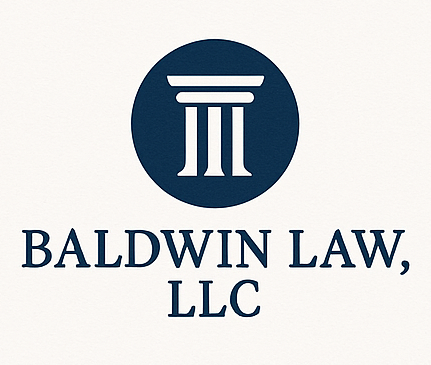Navigating Probate: Understanding the Process and Strategies to Avoid It
When it comes to estate planning, the probate process is a topic that often generates confusion and concern. At Baldwin Law, LLC, we've helped many clients navigate the complexities of probate and understand their options for avoiding it. In this blog post, we'll provide a general overview of probate, the probate process, and why you may want to consider strategies to minimize or eliminate the need for probate.
What is Probate?
Probate is the legal process of administering a deceased person's estate. This includes identifying and gathering the decedent's assets, paying any outstanding debts, and distributing the remaining assets to the appropriate beneficiaries, as outlined in the decedent's will or according to state intestacy laws.
The Probate Process
The probate process typically involves the following steps:
Filing the will (if one exists) with the local probate court.
Appointing an executor or personal representative to oversee the estate administration.
Identifying and valuing the decedent's assets.
Notifying creditors and paying any outstanding debts.
Filing tax returns and paying any taxes owed.
Distributing the remaining assets to the designated beneficiaries.
The probate process can vary in complexity and duration, depending on the size and complexity of the estate, the presence of a will, and any potential disputes among beneficiaries.
Why Avoid Probate?
There are several key reasons why individuals and families may wish to avoid the probate process:
Time and Cost: Probate can be a lengthy and expensive process, often taking several months to a year or more to complete. This can result in significant delays in the distribution of assets to beneficiaries.
Lack of Privacy: Probate proceedings become part of the public record, which can be a concern for those who value privacy.
Potential for Disputes: The probate process can sometimes lead to disputes among beneficiaries, which can further prolong the proceedings and increase legal fees.
Complexity: The probate process can be complicated, especially for those with complex estates or blended families. This can create challenges and additional expenses.
Strategies to Avoid Probate
To minimize or avoid the probate process, individuals may consider the following strategies:
Establishing a Revocable Living Trust: By transferring assets into a living trust, those assets can be distributed to beneficiaries outside of the probate process.
Designating Beneficiaries: Ensuring that accounts and assets (such as life insurance policies and retirement accounts) have designated beneficiaries can allow them to pass directly to those beneficiaries without going through probate.
Holding Property Jointly: Owning property jointly with rights of survivorship can enable the property to pass directly to the surviving owner, bypassing probate.
Gifting Assets During Lifetime: Gifting assets to beneficiaries during one's lifetime can reduce the size of the estate subject to probate.
At Baldwin Law, LLC, we understand the importance of tailoring estate planning strategies to each client's unique needs and goals. If you have questions about probate or are interested in exploring ways to minimize its impact on your estate, we encourage you to schedule a consultation with our experienced attorneys.
Remember, effective estate planning is not just about the distribution of assets – it's about preserving your legacy and providing for your loved ones in the most efficient and cost-effective way possible.
